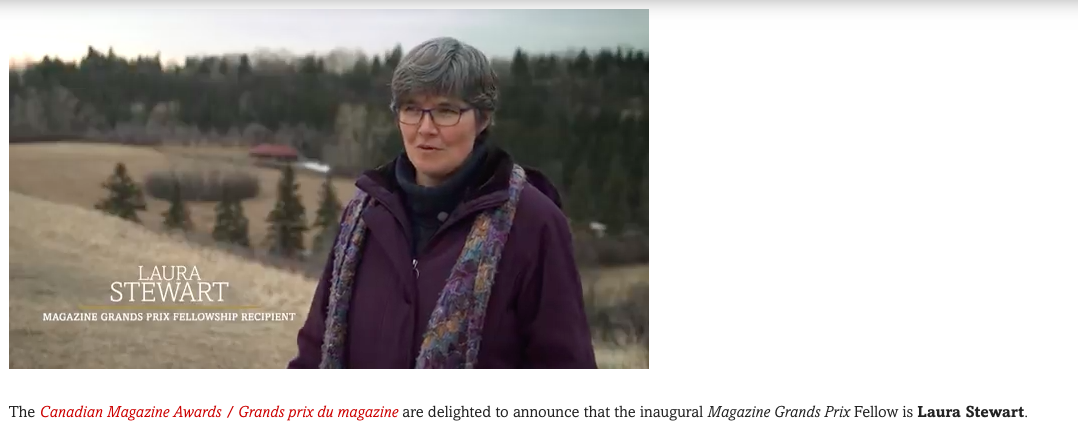Laura Stewart will investigate climate change on Saskatchewan’s grasslands.
This story was funded by the J-Source Patreon campaign
By Jessie Anton
It was prairie journalist Laura Stewart’s daughter who noticed a Magazines Canada ad for a fellowship to fund a reporter. With her passion for journalism and her love of the land, Stewart decided to jump in and pitch her stories about Saskatchewan’s grasslands to Briarpatch magazine.
With the help of Briarpatch editor Tanya Andrusieczko, Stewart crafted a fellowship submission too hard to pass up. In April, it was official: Stewart is the first Magazine Grands Prix Fellow.
Now tasked with writing four 2,000-word pieces and multiple blog posts for Briarpatch on Saskatchewan’s grasslands, Stewart is overwhelmed but excited for the opportunity.
She plans to tackle her work in a way that targets what’s missing in the discourse on climate change.
“I think a lot of the gaps about (climate change) are not so much about what people know, but about what’s being told,” said Stewart. “I think that getting out there and talking to people in this context, and hearing their concerns and their responses – and seeing how people respond to my articles – will be a learning experience.”
The fellowship comes almost a year after Briarpatch was on the brink of shutting down.
On June 22, 2016, the Regina-based magazine announced on its website that it was in a financial crisis and couldn’t print more than one issue in advance.
In the following months, Briarpatch raised more than $25,000 in donations from its readers, which would keep the publication above water, and it’s been sailing ever since.
David Gray-Donald, publisher of Briarpatch, said the magazine is looking forward to producing stories that have been left in the dark for so long. He added that Briarpatch is ready for Stewart to write about climate change from a perspective of compassion for the land and its people.
“(Climate change) is a very taboo topic and if you talk about things in a way that threatens (people), they get really defensive,” said Gray-Donald. “I think a lot of media either cover it from an overly-simplistic way that doesn’t address the human element or they just cover it fully in the interest of industry.”
Getting paid a living wage thanks to the $5,000 funded by Magazines Canada and the other $5,000 through Briarpatch reader donations, Stewart will spend until the end of August working full-time to research, interview and write these pieces.
Along with touching on the controversial carbon tax, she hopes to highlight in her writing the value of Saskatchewan’s remaining natural grasslands.
“There are still native grasslands, but a huge portion of it has been converted into farmland,” explained Stewart. “I think we’re so disconnected from that – even those of us who are concerned about it struggle to put into words why it’s important, because we don’t have that sense of grasslands as natural and valuable.”
A week into her position, Stewart says she’s flowing with the tide when it comes to where her writing will take her. However, she hopes by the end of her work readers will understand what’s happening on the ground in Saskatchewan when it comes to climate change – from both an earth science and a community perspective.
As for Briarpatch, it’s excited to have the financial stability to track a story issue to issue.
“I want to make sure that Laura Stewart is able to tell her stories as she sees them,” said Gray-Donald. “It’s just great to have this funding and I hope it will show the strength of what can happen when a person is allowed to follow a really interesting story. Maybe (the fellowship) emboldens independent media to go for it, to try new funding models – to cover those stories that aren’t being covered otherwise.”

